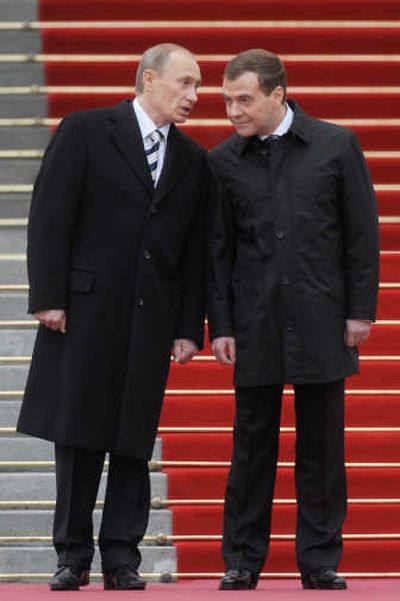Medvedev inaugurated as president of Russia

MOSCOW – With the swearing in of Dmitry Medvedev as Russia’s president, the Kremlin leadership now mirrors one of its most potent symbols – the double-headed eagle.
Standing next to the new president during a ceremony Wednesday in a gilded Kremlin hall was his predecessor, Vladimir Putin, the man who nurtured Medvedev’s rise to power and who will now be his prime minister.
The world waits to see whether the two can jointly rule this sprawling country, or whether, like the Byzantine crest, they will gaze in opposite directions.
Medvedev has promised to strengthen democratic freedoms and suggested he will move Russia in a more pro-Western direction, raising the hopes of those who want to see the country shift away from Putin’s authoritarian rule.
But Putin spent his last weeks as president planning to strengthen the prime minister’s role and assuming the chairmanship of the United Russia party, which dominates politics from the municipal level to the parliament.
Both Medvedev and Putin have dismissed concerns the dual leadership will lead to conflict and instability.
But Wednesday’s ceremony in the glittering Andreyevsky Hall of the Kremlin Grand Palace, which overlooks the Moscow River, only emphasized the apparent contradictions between the 42-year-old president and his future prime minister.
While Medvedev spoke of economic and democratic development after taking the oath of office, Putin said in his own brief remarks that the Russian people “have many times defended their own path and their sovereignty.”
The language echoed Putin’s past allegations that Western democracies are trying to impose their political system on Russia as part of a campaign of surrounding and weakening the country.
Under the Russian constitution, the presidency has sweeping powers. But the powers of the prime minister’s office are elastic, and Putin appears poised to expand them.
The new premier is expected to have increased authority over governors and regional leaders. According to Russian press reports, Putin will have 11 deputies compared to the five who served his predecessor, Viktor Zubkov.
In addition, many analysts expect Medvedev to defer to Putin, his longtime mentor, on important decisions – at least during Medvedev’s first few months in office.
Putin has vowed to remain prime minister as long as he is needed. There is speculation he sees the job as a transitional post, with some expecting him to retire from politics but others predicting he will someday return to the presidency. Term limits required him to give up that post after two consecutive terms.
Several times, Putin loyalists pleaded with him to support a change in the constitution that would permit him to remain president. But he rejected those entreaties, saying he would respect the constitution he inherited.
“Eight years ago when I was sworn in as Russian president for the first time, I pledged to work openly and honestly, to loyally serve the people and the state,” he said during the inauguration ceremony. “I did not break my pledge!”